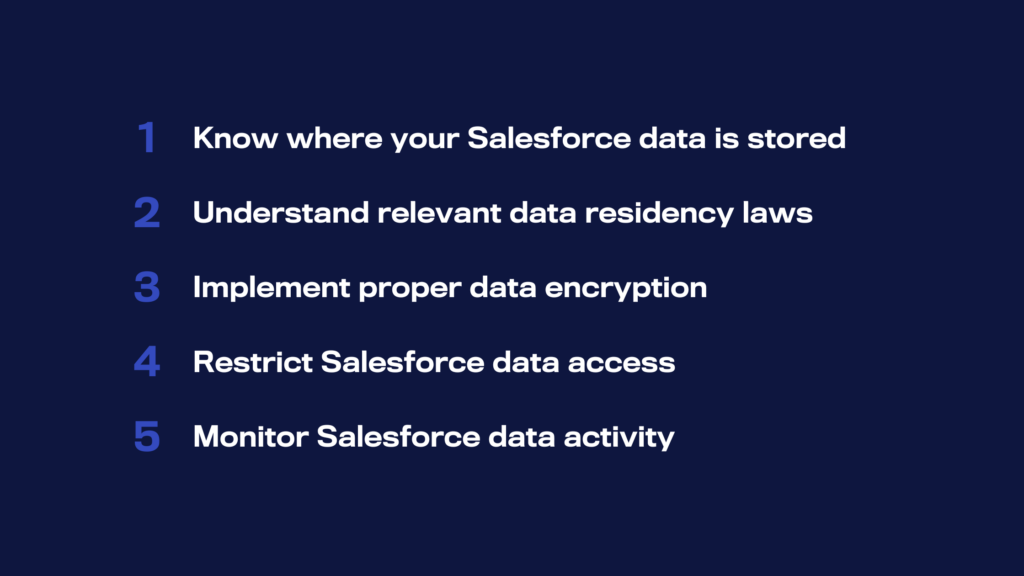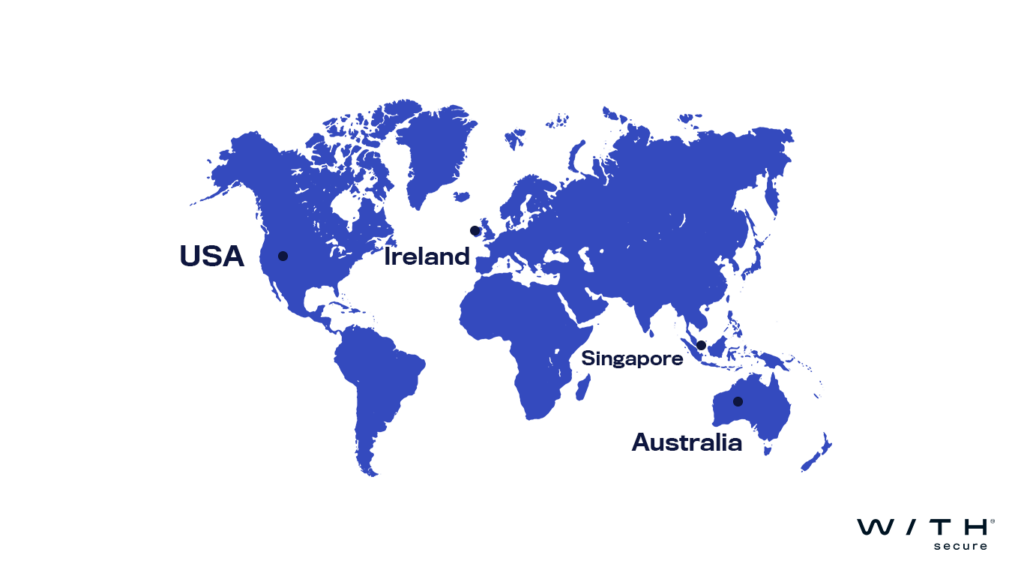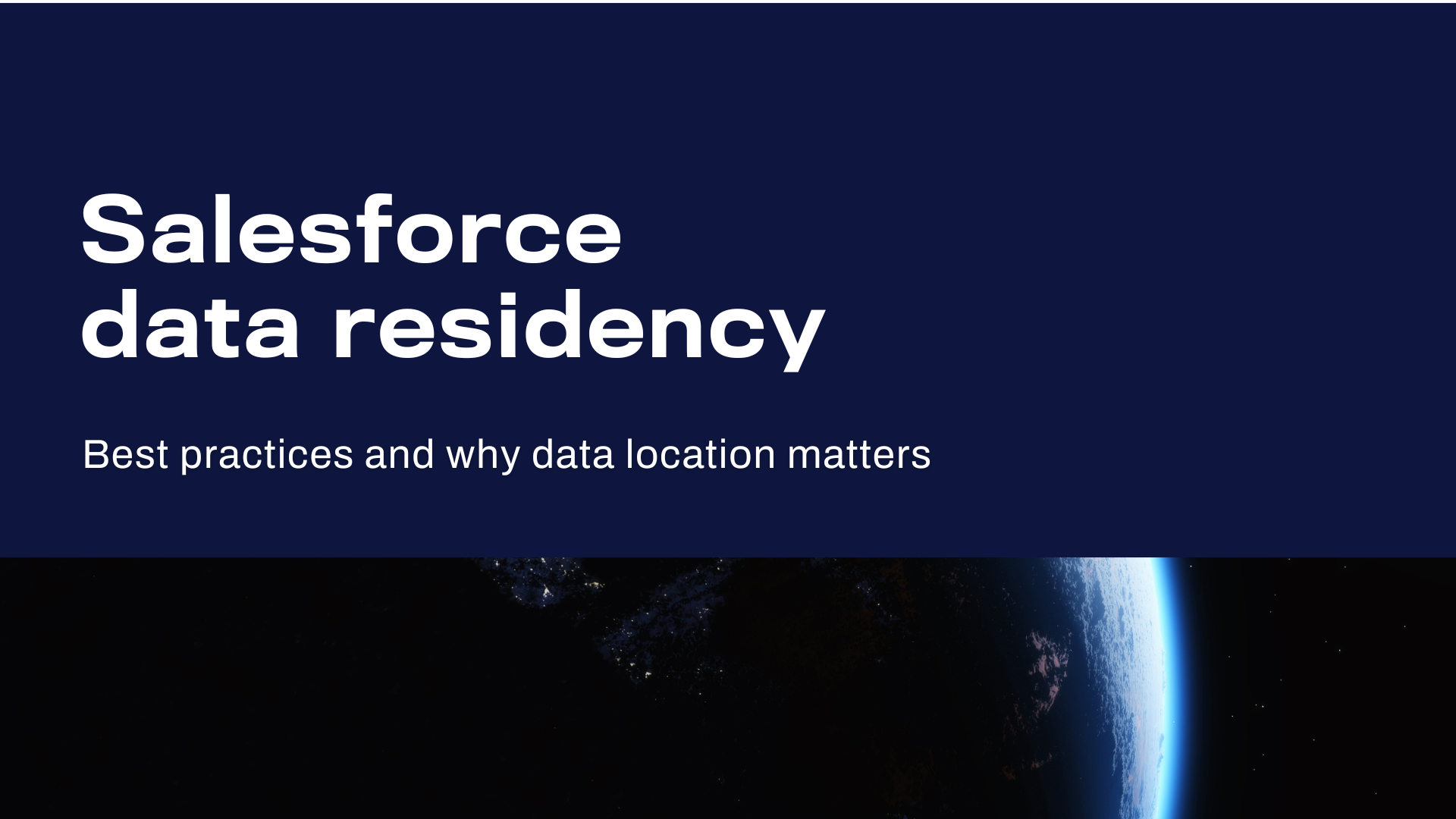Meet your compliance requirements and control your Salesforce data location
Data residency is a critical consideration for organizations using Salesforce to ensure the security and compliance of their sensitive customer data. With Salesforce’s global reach, understanding where your Salesforce data is physically stored and the legal implications is key to mitigating both cyber and compliance risks.
What is the difference between data residency, data localization, and data sovereignty?
While these three terms are related, they have distinct meanings within the realm of data management and compliance. Data residency refers to the physical or geographical location where an organization’s data is stored, whether on servers, databases, or in data centers. Data localization is the requirement that certain data must be stored and processed within the country or region where it was collected, without being transferred outside of those borders. Data sovereignty is the principle that data is subject to the laws and regulations of the country or jurisdiction where it resides, regardless of the nationality of the person or entity that owns the data. Understanding the nuances between these concepts is crucial for organizations to ensure they are complying with relevant data privacy and security regulations.
What is Salesforce data residency?
Data residency refers to the physical location where an organization’s Salesforce data is stored, whether on servers, databases or in data centers. The country or region where Salesforce data resides determines the privacy laws, data sovereignty regulations and security requirements that apply to that data. For Salesforce users, data residency is especially important because Salesforce has data centers located around the world. Depending on your Salesforce org’s settings, your Salesforce data could be stored in the U.S., Europe, Asia or elsewhere.
Depending on the country’s legislation and regulations, these themes are often included:
- Storage location: Many countries have laws that require certain types of data to be stored within their own borders.
- Transfer restrictions: Some jurisdictions have requirements surrounding data transfer across borders. For instance, the EU’s General Data Protection Regulation (GDPR) stipulates that data can only be transferred out of the EU to countries that provide adequate levels of data protection.
- Local access: Regulations may require that the local government or specific regulatory bodies have access to the data.
- Privacy protections: Depending on the country, organizations may be required to provide specific privacy protections for the data they store, such as practices around data encryption, pseudonymization, or anonymization.
- Data breach notifications: Some countries require that organizations notify the relevant authorities and/or the affected individuals in the event of a data breach.
- Record keeping: Organizations may be required to keep records of all data processing activities.
- Consent: In some cases, organizations might need to obtain explicit consent from the data subjects before storing or processing their data.
For example, in Australia and Singapore, there has been high demand from public sector organizations and private companies operating in regulated industries to have control over their Salesforce security data’s residence in the home country.
Why Salesforce data location matters?
There are several key reasons why Salesforce data residency is critical for security:
- Legal compliance: Different countries and regions have varying laws around data storage, protection and privacy. Storing Salesforce data in compliance with local data residency regulations is mandatory to avoid legal issues and penalties.
- Data privacy protection: Data residency rules exist to safeguard the privacy of individuals whose data is collected. Adhering to Salesforce data residency ensures customer data is handled securely and with proper privacy controls.
- Reduced security risks: Storing Salesforce data locally within a country’s borders minimizes the risks associated with cross-border data transfers, such as unauthorized access, data breaches and data loss. Local storage is typically more secure.
- Customer trust: Customers will have more confidence in a Salesforce-powered business that respects data privacy laws and stores data in accordance with Salesforce data residency requirements. This builds trust.
- Business continuity: In the event of a disaster, having Salesforce data stored locally can enable faster recovery, as data centers in the affected region can focus on restoring service.
Best practices for managing Salesforce data residency
To ensure your Salesforce data is secure and compliant from a data residency perspective, follow these best practices:
- Know where your Salesforce data is stored: Determine the specific data centers and regions where your Salesforce org’s data is physically stored. This information should be available from Salesforce or your Salesforce consulting partner.
- Understand relevant data residency laws: Research the data residency, data sovereignty and data privacy laws that apply to your Salesforce data based on where it is stored. Consult with legal counsel to ensure compliance.
- Implement proper data encryption: Use strong encryption to protect Salesforce data both at rest and in transit, especially if data is being transferred across borders. Leverage Salesforce’s built-in encryption capabilities, and make sure that third-party applications align.
- Restrict Salesforce data access: Limit access to Salesforce data to only those employees and systems that require it. Use Salesforce’s robust user permissions and sharing settings to control data access.
- Monitor Salesforce data activity: Continuously monitor Salesforce data usage, access and sharing activity to detect any suspicious behavior that could indicate a data breach or compliance issue. Leverage Salesforce’s security monitoring tools.
By following these best practices and partnering with a Salesforce consulting firm that prioritizes data residency and security, you can keep your Salesforce data safe and compliant no matter where it is stored around the world.

How WithSecure™ Cloud Protection for Salesforce helps you meet your compliance requirements
WithSecure™ Cloud Protection for Salesforce is hosted on AWS data centers. The solution runs on data centers in Europe (Ireland), USA, Japan, Australia and Singapore – and more countries, like Canada, will soon follow.

You can fully control your data’s location, in other words, in which data center your data is processed. Data is strictly encrypted both during transit and rest. Data handling and security practices follow the strictest industry standards. Also, you don’t have to worry about any hidden hosting costs or efforts.

